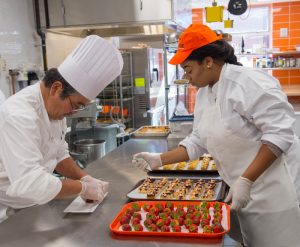
Social justice, health and wellness, environmental sustainability, and other consumer interests are driving increased market demand for “value-based” foods such as organic foods, which comprise 5.7 percent of food sold in the U.S. according to the Organic Trade Association (OTA).
The OTA reports the U.S. organic food market in 2018 at $47.8 billion. The U.S. Department of Agriculture’s Economic Research Service finds that organic food sales have exhibited double-digit growth during most years since 2000 and the organic share has been growing rapidly.
As a result of these industry and market shifts, there is growing demand for food professionals knowledgeable about food industry practice and operations as well as food-related social movements. Sourcing local, organic, or fair trade products for foodservice, retail, or special events is becoming important for firms interested in pleasing consumers and catering to diverse interests.
The Department of Nutrition and Food Studies at Syracuse University’s Falk College recently launched its new undergraduate minor in Sustainable Food Enterprises to prepare students for food industry careers with courses in food safety (ServSafe and Hazard Analysis and Critical Control Points), restaurant and foodservice operations, feeding people on a large-scale, operational and policy aspects of the foodservice industry, and marketing and managing events, conferences, and workshops.
In the minor, students choose from a set of food economies courses focused on labor issues, food enterprises as urban development strategies, establishing and operating emergency feeding systems, food cooperatives, values-based certification systems such as organic and fair trade, and social justice in the food industry. Students can also choose from a set of business courses to acquire skills around marketing, entrepreneurship, event management, and more.
These courses culminate in a senior-level Food Enterprises course designed specifically around the concepts of “impact investing” and “social entrepreneurship,” or structuring firm operations to promote positive social outcomes. “This particular course strengthens their ability to navigate the business side of food and all that encompasses while working for the changes that add value to their areas of interest,” says Chef Mary Kiernan, chef instructor for the Food Enterprises course.
“The topics covered in Food Enterprises prepare students to be in-tune with the business aspects of any food enterprise—from understanding an income statement to what motivates our purchasing choices,” says Kiernan. “The students explore a variety of food enterprises from the traditional eating and drinking segments, to agro (agricultural) economies, to technology shaping our food ways.”
The course is designed for the students to find a problem they would like to tackle and then tackle it with a food enterprise solution. “Students bring perspectives from all over,” she says. Some recent student interest areas in Chef Kiernan’s class include food security on college campuses, laws surrounding food and food enterprises, and individual food items that have a nutritional benefit in the marketplace, among others. “The students also research ESG (environmental, social, and governance) investing to better understand what it means, how it works, who is participating, and at what level,” she adds.
Falk College facilities support student learning, specifically in the Susan R. Klenk Learning Café and Kitchens, where students have access to hands-on learning opportunities in nutrition, dietetics, and culinary-related fields under the guidance of professional chefs as their course instructors. The 5,000-square-foot facility includes experimental food lab and commercial kitchens, a baking nook, and café outfitted with the same equipment found in industry-leading restaurants and culinary institutions.
